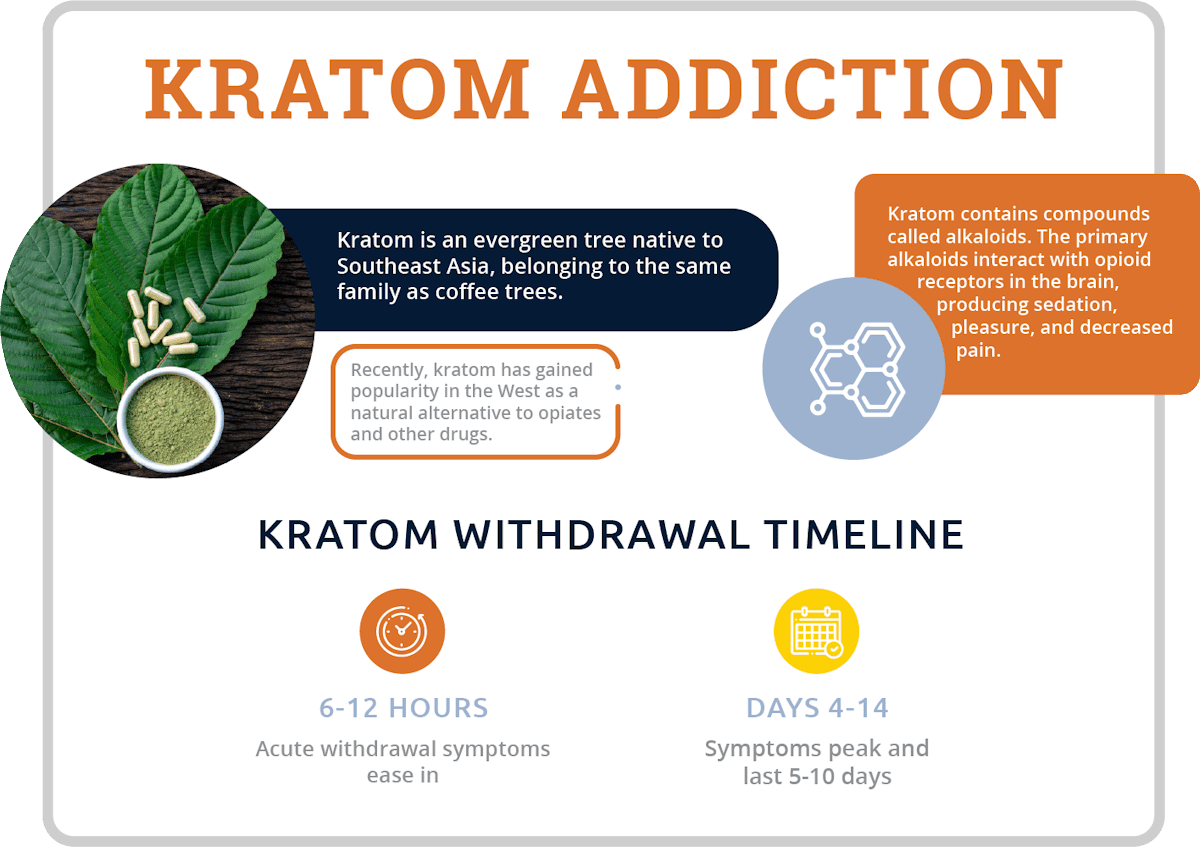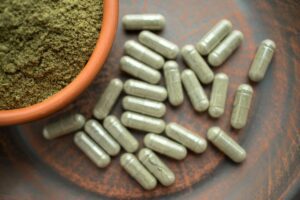There are many illicit substances in use today that started as either recreational drugs or even as all-natural supplements. One example is the herbal extract known as kratom, which has captured the attention of both thrillseekers looking for the next best high and medical professionals giving out warnings about its harmful effects. Used as a recreational drug, the main concern many have over this substance is how long does kratom stay in your system, as the duration of it being in the body could also determine the severity of its effects. Any person that has been dependent on kratom will need drug detox to remove kratom (and other substances) from the body.
Jump to Section
What is Kratom?
Kratom is an extract taken from the leaves of the eponymous tree found in Southeast Asia and Africa. While the kratom tree, also known by its scientific name mitragyna speciosa, is a member of the coffee family, it is not used to make a safe beverage. Locals have used the leaves of this tree for a variety of purposes, such as a basic stimulant as it supposedly helps fight off fatigue and boost productivity.
There are even accounts that it is used in esoteric religious ceremonies because of its effects which are said to be similar to opium. These effects are mainly due to compounds found in the kratom extract, namely mitragynine and 7-hydroxymitragynine, which are believed to interact with opioid receptors in the brain in a similar fashion as the popular drug.
The Drug Enforcement Administration (DEA) has not named kratom as a controlled substance yet, but it has been recognized as a substance of concern. Studies done on kratom extract by the DEA reveal that when taken in low doses, the substance in the kratom leaves produces stimulant-like properties. In higher doses, however, it has properties that simulate the actions of opiate drugs, specifically pain-relieving or analgesic properties. Kratom is of particular interest to the DEA because it has developed a cult-like following in the US as groups are trying to drum up support for the medicinal application of kratom, specifically for its pain-relieving properties and clinical potential in alleviating the withdrawal symptoms of other substances like heroin.

Why is Kratom Highly Addictive?


For people who don’t suffer from chronic pain, opioids become highly habit-forming because of the euphoric sensation it gives, on top of creating a highly relaxed state due to the sedative effect opioids create in the brain. These individuals eventually check into a treatment facility for opiate addiction rehab. Kratom is said to have these same effects because of its trait of interacting directly with the brain’s opioid receptors.
It is also quite difficult to convince people of the dangers of using kratom because of the belief that organic medication alternatives, such as the leaves of the kratom tree, are safe to use regardless of the warning of medical professionals. People who use kratom have also found highly creative ways to consume it. Some take it in the traditional way, which is by chewing the leaves, while others take it mixed with cough syrup, soda, and ice. We here offer drug rehab in Illinois. Contact us today to get help.
How Long Does Kratom Stay in the System?
Studies done on kratom reveal that the duration and effects of the primary compounds of the substance are mostly dependent on the amount taken. As with most opioids, taking larger amounts could result in effects that last for several hours, with the substance staying in the body for just as long.
As kratom is not a recognized medicinal substance, there have been no studies done on it along the lines of medicinal use, which would also reveal its half-life. The half-life of a substance or drug is the amount of time that it takes for a person’s metabolism, specifically by the liver, to break down the drug and reduce it by half its concentration in the body. It is generally considered that numerous factors need to be considered in determining the exact amount of time needed to completely eliminate a substance or drug from the body, such as current health, genetic factors, existing conditions, and other specifics.
Existing research on kratom suggests the half-life of mitragynine could be anywhere from 24 hours to around five days for most individuals. The proper determination would rely heavily on the detectability of the substance in a person’s system, which again, would also depend on various factors. A person who has taken to chronic use of kratom, however, could provide a longer window of opportunity for detection, as chronic use could complicate the determination of the amount that was previously taken.
How Long Do the Effects of Kratom Last?
The duration of the effects of kratom typically depends on several factors, primarily the amount of it taken. Those who have used it say that at low doses, it produces a stimulant or energizing effect, while higher doses create a sedative effect quite similar to opioids. Those who use it in the traditional manner, namely by chewing the leaves, may need to do so around three to ten times a day to maintain the energetic feeling and euphoria. Chewing a few dried kratom leaves is said to produce effects within 10 minutes of the action and last for anywhere between one to one and a half hours.
Consuming large amounts of dried kratom leaves is believed to result in a calm, dream-like state that lasts for up to six hours. This is mainly the reason why kratom leaves are used in religious rituals and practices, much like the mushrooms that produce a psychedelic effect when consumed. The duration of the effects of kratom usually depends on a number of factors, including:
- Amount taken
- Medical conditions
- Age of the user
- Other substances used
- Potency/Purity of the substance used
- Natural tolerance of the user
- Method of consumption
- Genetics
- Food and water intake
As with most other substances, the effects of kratom may be heightened if someone takes it on an empty stomach. For those who have had a meal before taking it, the effects might not occur for at least an hour or so. In capsule form, the effects of kratom may take longer to kick in because it has to be dissolved in the person’s stomach.
Will Kratom Show Up in a Drug Test?
A common misconception about drug abuse like kratom is that because it could be taken in its base form, which is the leaves, it would be undetectable in a drug test. Truth be told, kratom is reported to not show up on drug tests designed to detect commonly abused substances like those referred to as the SAMHSA 5, which include Amphetamines, Cocaine Metabolite, Marijuana, Opiates, and Phencyclidine (PCP). Kratom alkaloids, however, do show up in other drug testing methods.
There are kratom alkaloids that could be detected in certain urine tests. Due to the fact that kratom is not recognized as a controlled substance, there is little research to indicate how long kratom would be detectable in a user’s urine, although it is believed that there could be trace amounts detected in a urine test for over a week.
As blood tests are more thorough, it could be a better way to determine if someone took kratom and at the same time theoretically determine the quantity taken as well. Blood tests are believed to be able to determine concentration levels of kratom, and if the user is a heavy or long-term user of kratom, the metabolites of the substance in the body could still be determined even after several days following ingestion.
Hair follicle testing has long been held to be a reliable way to test for substance use, as it could hold genetic information for a longer period of time. As there have been no conclusive tests done on kratom along the lines of chemical tests done on popular abused substances, it is not known if hair follicle testing could determine the presence of kratom in the system.
Oral fluid testing is frequently used to test for a variety of types of drugs, and this is why it is believed that saliva testing could be used to identify kratom metabolites. However, due to the fact that kratom is not a controlled substance, it is not known if it will show up in a saliva test.


Let Northern Illinois Help You Find a Better Way to Recovery
There are many substances being used today that are said to be organic, natural, and safer alternatives to treat the withdrawal effects of other substances. A lot of the things said about these things, however, are false. This is how people form an addiction to substances that are not typically held to be illegal drugs. We know this because we here at Northern Illinois Recovery make a point to know all the important facts about substance dependence so that we could help people better. Ask us about our partial hospitalization, intensive outpatient, and outpatient substance abuse treatment programs right now. Let us help you now.


Licensed Physician and Surgeon
Dr. Beth Dunlap, a board-certified addiction medicine and family medicine physician, and is the medical director at Northern Illinois Recovery Center. She is responsible for overseeing all the integrated medical services at both campuses. Beth completed medical school, residency, and fellowship at Northwestern University, where she continues to serve on the faculty as a member of the Department of Family and Community Medicine. She has extensive experience in addiction medicine at all levels of care, and her clinical interests include integrated primary care and addiction medicine, harm reduction, and medication-assisted treatment.



